Dear Zazie, Here is today’s Lovers’ Almanac from Mac Tag. Rhett
The Lovers’ Almanac
Dear Muse,
© copyright 2019 mac tag/cowboy coleridge all rights reserved
and i would you, all the day
“And every night.”
if with me you would
“In arms embraced.”
too soon the night would pass
desirous need inspires us
is there ought else
unbends the mind
thine be the charms,
and want laid rest
© copyright 2018 mac tag/cowboy coleridge all rights reserved
- ‘Twas when the seas were roaring
With hollow blasts of wind,
A damsel lay deploring,
All on a rock reclined.- The What D’ye Call It (1715), Act II, sc. viii.
- So comes a reckoning when the banquet’s o’er,—
The dreadful reckoning, and men smile no more.- The What d’ ye call it (1715). Compare: “The time of paying a shot in a tavern among good fellows, or Pantagruelists, is still called in France a ‘quart d’heure de Rabelais,’—that is, Rabelais’s quarter of an hour, when a man is uneasy or melancholy”, Life of Rabelais (Bohn’s edition), p. 13.
- My lodging is on the cold ground,
And hard, very hard, is my fare,
But that which grieves me more
Is the coldness of my dear.- My Lodging Is on the Cold Ground (1720), st. 1.
- No retreat. No retreat. They must conquer or die who’ve no retreat.
- “We’ve Cheated the Parson” (song), Polly: an Opera (1729), Air 46, Act II, sc. x.
- Life is a jest; and all things show it. I thought so once; and now I know it.
- My Own Epitaph, inscribed on Gay’s monument in Westminster Abbey; also quoted as “I thought so once; but now I know it”.
- All in the Downs the fleet was moor’d.
- Sweet William’s Farewell to Black-eyed Susan, reported in Bartlett’s Familiar Quotations, 10th ed. (1919).
- Adieu, she cried, and waved her lily hand.
- Sweet William’s Farewell to Black-eyed Susan
The Beggar’s Opera (1728)
- Through all the Employments of Life
Each Neighbour abuses his Brother;
Whore and Rogue they call Husband and Wife:
All Professions be-rogue one another:
The Priest calls the Lawyer a Cheat,
The Lawyer be-knaves the Divine:
And the Statesman, because he’s so great,
Thinks his Trade as honest as mine.- Peachum, Act I, air 1.
- ‘T is woman that seduces all mankind;
By her we first were taught the wheedling arts.- Act I, scene i.
- Over the hills and far away.
- Act I, scene i. Compare: “O’er the hills and far away”, D’Urfey, Pills to purge Melancholy (1628–1723).
- You know, my Dear, I never meddle in matters of Death; I always leave those Affairs to you. Women indeed are bitter bad Judges in these cases, for they are so partial to the Brave that they think every Man handsome who is going to the Camp or the Gallows.
- Mrs. Peachum, Act I, sc. iv.
- How the mother is to be pitied who hath handsome daughters! Locks, bolts, bars, and lectures of morality are nothing to them: they break through them all. They have as much pleasure in cheating a father and mother, as in cheating at cards.
- Mrs. Peachum, Act I, sc. viii.
- Do you think your Mother and I should have liv’d comfortably so long together, if ever we had been married?
- Peachum, Act I, sc. viii.
- Can you support the expense of a husband, hussy, in gaming, drinking and whoring? Have you money enough to carry on the daily quarrels of man and wife about who shall squander most? There are not many husbands and wives, who can bear the charges of plaguing one another in a handsome way.
- Mrs. Peachum, Act I, sc. viii.
- O Polly, you might have toyed and kissed,
By keeping men off, you keep them on.- Act I, sc. viii, air 9.
- Were I laid on Greenland’s Coast,
And in my Arms embrac’d my Lass;
Warm amidst eternal Frost,
Too soon the Half Year’s Night would pass.- Act I, sc. xxxiii, air 16.
- Macheath: And I would love you all the day,
Polly: Every night would kiss and play,
Macheath: If with me you’d fondly stray
Polly: Over the hills and far away.- Act I, sc. xxxiii, air 16.
- Fill ev’ry glass, for wine inspires us,
And fires us
With courage, love and joy.
Women and wine should life employ.
Is there ought else on earth desirous?- Matt, Act II, sc. i, air 19.
- The fly that sips treacle is lost in the sweets.
- Act II, scene ii.
- How happy could I be with either,
Were t’ other dear charmer away!- Act II, scene ii.
- If the heart of a man is depressed with cares,
The mist is dispell’d when a woman appears;
Like the notes of a fiddle, she sweetly, sweetly
Raises the spirits, and charms our ears.- Act II, sc. iii, air 21.
- I must have women—there is nothing unbends the mind like them.
- Macheath, Act II, sc. iii.
- Youth’s the season made for joys,
Love is then our duty.- Act II, sc. iv, air 22.
- Before the Barn-Door crowing,
The Cock by Hens attended,
His Eyes around him throwing,
Stands for a while suspended:
Then One he singles from the Crew,
And cheers the happy Hen;
With how do you do, and how do you do,
And how do you do again.- Act II, sc. iv, air 23.
- Man may escape from rope and gun;
Nay, some have outlived the doctor’s pill:
Who takes a woman must be undone,
That basilisk is sure to kill.
The fly that sips treacle is lost in the sweets,
So he that tastes woman, woman, woman,
He that tastes woman, ruin meets.- Act II, sc. viii, air 26.
- You base man you,—how can you look me in the face after what hath passed between us?—See here, perfidious wretch, how I am forc’d to bear about the load of infamy you have laid upon me— -O Macheath! thou hast robb’d me of my quiet—to see thee tortur’d would give me pleasure.
- Lucy, Act II, sc. ix.
- Sure men were born to lie, and women to believe them!
- Lucy, Act II, sc. xiii.
- How happy could I be with either,
Were t’other dear charmer away!- Macheath, Act II, sc. xiii, air 35.
- How happy I am, if you say this from your heart! For I love thee so, that I could sooner bear to see thee hang’d than in the Arms of another.
- Lucy, Act II, sc. xv.
- If love be not his Guide,
He never will come back!- Lucy, Act II, sc. xv, air 40 .
- The charge is prepar’d, the lawyers are met,
The judges all ranged,—a terrible show!- Act III, scene ii.
- Fill it up. I take as large draughts of liquor as I did of love. I hate a flincher in either.
- Mrs. Trapes, Act III, sc. vi.
- I don’t enquire after your Affairs– –so whatever happens, I wash my hands on’t—- It hath always been my Maxim, that one Friend should assist another– –But if you please—-I’ll take one of the Scarfs home with me. ‘Tis always good to have something in Hand.
- Trapes, Act III, sc. vi.
- The charge is prepared; the lawyers are met;
The judges all ranged (a terrible show!)
I go, undismay’d.—For death is a debt,
A debt on demand.—So take what I owe.- Macheath, Act III, sc. xi, air 57.
Today is the birthday of Émile Jean-Horace Vernet (Paris Louvre 30 June 1789 – 17 January 1863 Paris); French painter of battles, portraits, and Orientalist Arab subjects.


-

The Battle of Valmy (1826)
-
Polish Prometheus (1831)
-

Hunting in the Pontine Marshes (1833)
-

Scene from the Mexican Expedition in 1838 (1841)
-
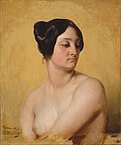
Study of Olympe Pélissier as Judith (1830)
-

The Taking of the Malakoff Redoubt (1858)
-
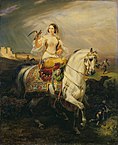
An Algerian Lady Hawking
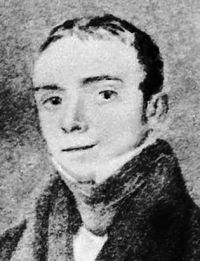 Today is the birthday of Thomas Lovell Beddoes (Clifton, Bristol 30 June 1803 – 26 January 1849 Basel, Switzerland); poet, dramatist and physician. Beddoes’ writing shows a constant preoccupation with death. In 1824, he went to Göttingen to study medicine, motivated by his hope of discovering physical evidence of a human spirit which survives the death of the body. He continued to write, but published nothing. He led an itinerant life after leaving Switzerland, returning to England only in 1846, before going back to Germany. He became increasingly disturbed, and committed suicide by poison at Basel, in 1849, at the age of 45. For some time before his death he had been engaged on a drama, Death’s Jest Book, which was published in 1850 with a memoir by his friend, T. F. Kelsall. His Collected Poems were published in 1851.
Today is the birthday of Thomas Lovell Beddoes (Clifton, Bristol 30 June 1803 – 26 January 1849 Basel, Switzerland); poet, dramatist and physician. Beddoes’ writing shows a constant preoccupation with death. In 1824, he went to Göttingen to study medicine, motivated by his hope of discovering physical evidence of a human spirit which survives the death of the body. He continued to write, but published nothing. He led an itinerant life after leaving Switzerland, returning to England only in 1846, before going back to Germany. He became increasingly disturbed, and committed suicide by poison at Basel, in 1849, at the age of 45. For some time before his death he had been engaged on a drama, Death’s Jest Book, which was published in 1850 with a memoir by his friend, T. F. Kelsall. His Collected Poems were published in 1851.
- A cypress-bough, and a rose-wreath sweet,
A wedding-robe, and a winding-sheet,
A bridal bed and a bier.
Thine be the kisses, maid,
And smiling Love’s alarms;
And thou, pale youth, be laid
In the grave’s cold arms.
Each in his own charms,
Death and Hymen both are here;
So up with scythe and torch,
And to the old church porch,
While all the bells ring clear:
And rosy, rosy the bed shall bloom,
And earthy, earthy heap up the tomb.- A Cypress-Bough, and A Rose-Wreath Sweet, from The Poetical Works of Thomas Lovell Beddoes (1890).
- Shivering in fever, weak, and parched to sand,
My ears, those entrances of word-dressed thoughts,
My pictured eyes, and my assuring touch,
Fell from me, and my body turned me forth
From its beloved abode: then I was dead;
And in my grave beside my corpse I sat,
In vain attempting to return- Dream of Dying, from The Poetical Works of Thomas Lovell Beddoes (1890).
And today is the birthday of Allan Houser (Allan Capron Houser or Haozous; near Apache, Oklahoma; June 30, 1914 – August 22, 1994 Santa Fe, New Mexico); Chiricahua Apache sculptor, painter and book illustrator born in Oklahoma. In my opinion, one of the most renowned Native American painters and Modernist sculptors of the 20th century.
Houser’s work can be found at the Smithsonian Museum of American Art, the National Museum of the American Indian, the National Portrait Gallery in Washington, D.C., and in numerous major museum collections throughout North America, Europe and Japan. Additionally, Houser’s Offering of the Sacred Pipe is on display at United States Mission to the United Nations in New York City.
Mac Tag

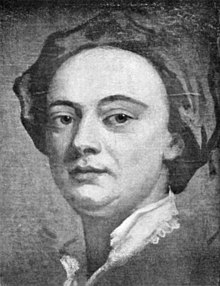
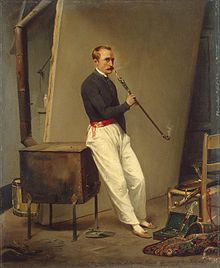
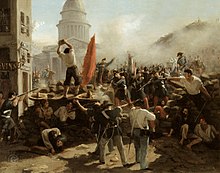

No Comments on "The Lovers’ Chronicle 30 June – thine – verse by John Gay & Thomas Lovell Beddoes – art by Horace Vernet & Allan Houser"